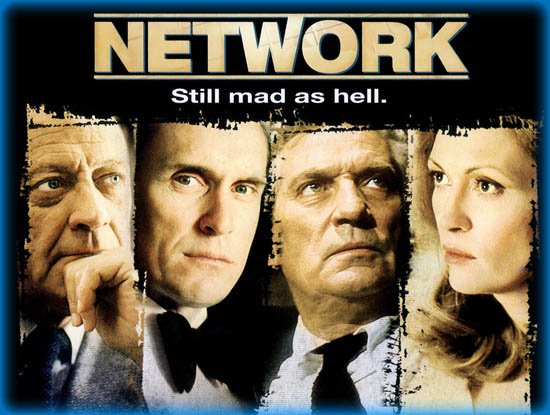'Network' (1976)
Brace yourself for a captivating journey into the realm of 'Network' (1976), a cinematic gem that has withstood the test of time. Directed by Sidney Lumet and written by Paddy Chayefsky, this film transcends its era to deliver a scathing critique of the media landscape, revealing a prophetic narrative that continues to resonate with audiences today.

The Rise of 'Network'
In the late 1970s, 'Network' emerged as a groundbreaking film that dared to expose the underbelly of the television industry. The story revolves around Howard Beale, an anchorman played by Peter Finch, whose mental unraveling becomes a catalyst for corporate manipulation and the commodification of news.
Unveiling a Dark and Prophetic Vision
Corporate Greed and Media Manipulation
'Network' brilliantly unveils the pervasive influence of corporate greed and its impact on the media landscape. The film depicts the unscrupulous tactics employed by network executives to boost ratings and maximize profits, blurring the line between news and entertainment. With the rise of sensationalism and tabloid-style reporting, 'Network' eerily foreshadowed the future of media consumption.
Societal Alienation and Desensitization
Paddy Chayefsky's incisive script sheds light on the alienation and desensitization plaguing modern society. The film explores the idea of individuals losing their sense of identity and becoming mere pawns in the pursuit of higher ratings. 'Network' compels viewers to reflect on their own relationship with the media, raising questions about authenticity and the erosion of personal connections in an increasingly digitized world.
Unforgettable Characters and Performances
Howard Beale: The Mad Prophet of the Airwaves
Peter Finch delivers a tour de force performance as Howard Beale, a disillusioned news anchor whose on-air breakdown captivates viewers. Beale's raw and impassioned speeches, most notably his iconic "I'm mad as hell and I'm not going to take this anymore!" monologue, solidify his status as a symbol of rebellion against societal apathy. Finch's portrayal earned him a posthumous Academy Award for Best Actor, a testament to his exceptional talent.
Diana Christensen: A Woman Ahead of Her Time
Faye Dunaway brings to life the ambitious television executive Diana Christensen, a character driven by her insatiable hunger for ratings and success. With her unwavering determination and calculated decisions, Dunaway infuses Christensen with a complex blend of vulnerability and ruthlessness, leaving an indelible mark on the film.
Impact and Legacy
Critically Acclaimed and Timeless Relevance
'Network' garnered critical acclaim upon its release, receiving ten Academy Award nominations and winning four, including Best Actor, Best Actress, Best Supporting Actress, and Best Original Screenplay. Its enduring relevance is a testament to its insightful exploration of media ethics and the consequences of unchecked corporate power.
A Warning from the Past
Decades after its release, 'Network' remains a powerful cautionary tale, urging society to remain vigilant in the face of media manipulation and the commodification of truth. Its themes of exploitation, moral decay, and the allure of spectacle continue to resonate, reminding us of the importance of independent thought and critical analysis.
Also Check Pulp Fiction
Conclusion
In the pantheon of cinematic achievements, 'Network' (1976) shines as an exceptional masterpiece that pushes boundaries and challenges societal norms. Its scathing critique of the media landscape, memorable characters, and enduring relevance make it an essential viewing experience for cinephiles and anyone seeking a thought-provoking exploration.




























